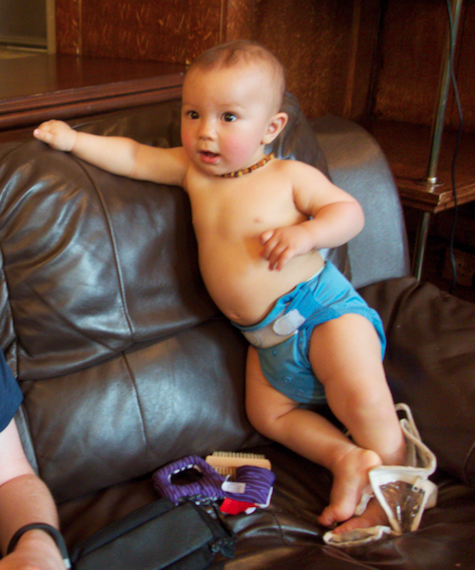Tags

Day 339 - This is not a recent pic. It was actually taken about a month before his first birthday. We were watching a World Cup match at a pub, and we stripped Baby-Ao down to his nappy because he was too hot. This photo cracks us up because of the way Baby-Ao is leaning against the sofa, and slightly crossing his legs, like he's a regular bloke discussing stuff at a pub.
In the last couple of weeks and days, Baby-Ao’s vocabulary has just exploded.
From his first word “papa”, probably around 9 months or so, he progressed to saying the following words in quite short order:
- “mama”
- “mam mam” (meaning “eat” or “food)
- “nono” (“no”)
- “caca” (in context. it’s French favourite, meaning “poo”)
- “more” (pronounced “moh” – he had been saying this for quite a while before my mummy friend TL identified it as “more” for me.- I’m pretty poor at deciphering Baby-Ao’s babbling. She also told me about the phenomenon of children using words they have to represent many more things that they don’t have the vocabulary for. e.g. “more” might be used as “help me”, “i like that” etc. instead of just in its actual context)
- “na nah” (“take” in Mandarin. He had been saying “na nah” and holding things out for me to take, but I didn’t understand how he could have learned the word given I don’t really use it with him. But I’ve recently asked his nanny about it, and apparently she uses the word “na” / take a lot with him)
- “bye bye”
In November, the Boy claimed that he heard Little Buddy say:
- “mei you” (Mandarin for “do not have”)
Recently though, his vocabulary has really burgeoned. In the last 2-4 weeks, he has said:
- “bu yao” (Mandarin for “do not” or “don’t want”. he walked around the room shaking his head and saying “bu yao bu yao bu yao”)
- “up” and “down” (according to my mummy friend TL, he made approximate sounds while going up and down steps)
- “pancake” (when the Boy pointed out a pancake shop and said “crepe”)
- “yi er san” (“one, two, three”, according to the nanny. I didn’t hear it, and I’ve never said these words to him, but apparently she does quite often)
- “mao” (Mandarin for “cat”, while petting one of our cats)
- “mummy”
- “daddy”
Baby-Ao has also walked around holding a phone (or a remote control, or any flat toy) to his ear, saying “Yaya”, which might either mean “Hello”, or more likely “Wei” or “wei wei” (“wei” is a common phone greeting in Chinese).
Today, he said the following words in Chinese playgroup, repeating after the teacher (some of them with pretty approximate / rough pronunciation):
- “yang” (“sheep”)
- “ji” (“chicken”)
- “ma” (“horse”)
- “jian bang” (“shoulder”)
- “jiao zi” (“toes”)
- “kou” (“mouth”)
And before bath time, as the Boy was reading Little Buddy a story book, Little Buddy said “tortue” ( “turtle” in French) echoing the Boy.
Separately, in Chinese class, he also successfully (maybe not entirely with intent) identified a rabbit, a sheep, and his nose.
Even though he uses only the same few classics in his daily life (most notably “nono”, his favourite expression, usually accompanied by violent head-shaking, back-arching, and attempts to wriggle away), it seems that he knows many more words than I give him credit for, and he is clearly on the roll in terms of mimicking words. Whether sound / word mimicry signifies or correlates with understanding isn’t entirely clear to me. But it’s a good start in building his vocabulary.
Interestingly, I’ve just read that babies’ ability to discriminate between phonetic sounds of all languages decline dramatically around 6 months (far earlier than I expected), that the size of a kid’s vocabulary at 24 months correlates with its future development and language skills, and that at 24 months, a kid should have at least 50 words.
Resources which may be of interest:
1. Babies benefit from early foreign language lessons
2. Language acquisition in Wikipedia
3. Talking milestones by Babycentre
